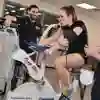





Harness the power of nutrition to enhance performance and improve lives.
This degree equips you with the scientific knowledge and practical skills to support both athletic excellence and public health through evidence-based practice.
You’ll develop a strong foundation in core disciplines – including physiology, psychology, biomechanics and nutrition – preparing you for a career in health, sport, or exercise-focused roles.
With access to real-world placements, applied projects, and strong industry links, you’ll gain valuable experience and a competitive edge in an evolving and in-demand field.
About this course
What you eat can shape how you train, perform, and recover. On our BSc Sport and Exercise Science with Nutrition degree, you’ll discover how science and nutrition combine to boost athletic performance and improve public health.
You’ll explore areas like physiology, biomechanics, psychology and sports nutrition — then put your knowledge into action through hands-on placements with organisations such as Hull City, Hull KR, Hull FC, the NHS, schools and public health providers.
With access to cutting-edge facilities including motion capture labs, an environmental chamber, a specialist kitchen and strength and conditioning suites, you'll build the skills to stand out in a competitive industry.
Whether you're aiming for elite sport, clinical settings or community health, this course gives you the confidence, experience and expertise to make an impact.
Fuel performance, improve lives
Foundation year
A foundation year at the University of Hull gives you a solid grounding of knowledge and boosts your academic skills, so you can progress on to your chosen programme with confidence.
The foundation course you enrol on may not be an exact match to your chosen degree, but don’t worry. Our foundation courses combine content from multiple related courses in the same subject area, giving you more flexibility and choice about the degree path you take.
For example, if you apply for a Music Foundation Year, you’ll join our Media Foundation course. So, if you decide to switch - say, from Music to Graphic Design - you can do so without restarting your foundation year.
Module options
Each year, you’ll study modules worth a certain number of credits, and you need 120 credits per year. Most modules are 20 credits – so you’ll study six modules each year. Some longer modules, such as a dissertation, are worth more. In these cases, you’ll study fewer modules - but the number of credits will always add up to 120. Some modules are compulsory, some are optional, so you can build a course that’s right for you.
Filters
Preparing for Learning in Higher Education
This module is designed to give you the best possible start to your university studies, making sure you have all the essential skills you need to succeed. Through lectures and workshops we will teach you how to write in an academic style, how to find quality sources, and how to reference work, culminating in writing up a mini-research project.
core
20 credits
Group Challenge
In a group, you'll formulate questions that can be tested by scientific investigations and take part in weekly workshops with academics.
core
20 credits
Foundation in Data Analysis
Develop a strong foundation in data collection and analysis. This module will introduce you to qualitative and quantitative data and how to analyse it; the collection of primary and secondary data; the production of high-quality graphics; and report writing.
core
20 credits
Introduction to Biological Sciences 1
This module covers basic knowledge on cells and biological molecules and how they are connected to the function of major organ systems in animals, plants and humans. The main topics are cell structure, exchange and transport, the genetic code, microbiology and energy processes.
compulsory
20 credits
Introduction to Sport, Health and Exercise Science
Module information coming soon.
compulsory
20 credits
Foundation Maths Skills
This module delivers core mathematics skills at level two and three to give a solid basis for future studies. You will study the following topics: manipulation of numerical data and converting between different units of measurement; exponentials and logarithms; and standard form and problems involving ratio, proportion and percentages.
optional
20 credits
Foundation Mathematics 1
This module delivers core mathematics skills to build a solid basis for future studies. You will study the following topics: factors, multiples, indices, fractions and standard form; algebra, linear and quadratic equations; averages and spread; functions, exponentials and logarithms; and right angled triangles and trigonometry.
optional
20 credits
Foundation Mathematics A
You will study pure mathematics topics, including proof, algebra, trigonometry, differentiation, integration, exponentials, logarithms, sequences and series. The applied topic is probability and statistics.
optional
20 credits
Human Physiology and Nutrition
Examine the key body systems including the circulatory, respiratory, nervous and gastrointestinal – in relation to metabolism, energy production and macronutrient function.
compulsory
20 credits
Our facilities





Watchlist
Degrees that live up to life
Course montage
1 min
Dr Stephen Heyes
Course overview
1 min
Facilities
Course Highlight
3 mins
Strength and Conditioning Course Overview
Course overview
2 mins
Featured academics
Our experts are dedicated to advancing nutritional science in support of health, wellbeing, and performance.
In addition to delivering a rich and varied education portfolio, they are actively engaged in cutting-edge research that shapes the future of the field.

Professor Natalie Vanicek
Professor of Clinical Biomechanics
Natalie is a Professor of Clinical Biomechanics and Head of Team for Sport, Exercise and Rehabilitation Sciences. Natalie is a fellow of the HEA and her research is focused on improving quality of life for people living with a lower limb amputation.

Dr. James Bray
Senior Lecturer in Sport Nutrition & Physiology
James is dual accredited as both a BASES Sport Scientist and an Academic Associate with the SENR. He is a Senior Fellow of the Higher Education Academy (HEA) and has published extensively in the fields of sport nutrition and applied physiology.
Entry Requirements
What do I need?
When it comes to applying to university, you'll need a certain number of UCAS points. Different qualifications and grades are worth a different amount of points. For this course, you'll need 80 UCAS points.
For applicants with qualifications in subjects other than those key to the degree, we will usually require a minimum of 80 points from A levels, BTEC, or other equivalent qualifications.
We consider experience and qualifications from the UK and worldwide which may not exactly match the combinations above.
But it's not just about the grades - we'll look at your whole application. We want to know what makes you tick, and about your previous experience, so make sure that you complete your personal statement.
Have questions? Our admissions team will be happy to help.
Typical offer
80 UCAS points
A levels
CDD
BTEC
MMP
Fees & Funding
How much is it?
For UK students, our standard course fee is £9,535 per year. Keep in mind that some courses are longer - for example, spending your third year abroad will make your degree four years in total.
If you choose to study a foundation year as part of your course, the fee is TBC.
How do I pay for it?
You can take out a tuition fee loan to cover the full cost of your course. Once you’ve successfully applied for this, you don’t need to do anything else – the money is sent straight to us.
You can also take out a maintenance loan of up to £10,544 a year to cover your living costs, depending on your household income.
Remember, you won’t start paying your loans back until you’ve left university and earn more than £25,000 per year.
See our full fees and funding information for more details and to find out what support we can offer.
Foundation Year Fee
TBC
Standard Tuition Fee
£9,535 / year
The amount you pay may increase each year, in line with inflation - but capped to the Retail Price Index.

Future prospects
On this degree, you’ll gain the scientific knowledge and real-world experience to prepare for a wide range of careers across sport, health and exercise settings. From working as a sport or performance nutritionist in professional sport, to roles in health promotion, education, and exercise referral – your options are broad and growing.
You’ll also be well placed to progress onto specialist postgraduate pathways, including our MSc in Nutrition and Dietetics, Strength and Conditioning, or SENR-accredited programmes via the fast-track route.
Our expert careers team will support you throughout your degree with tailored advice and training, and you’ll have opportunities to connect with employers and showcase your work at events like our annual Student Thesis Conference.
Become part of the next generation of futuremakers
Like what you've seen? Then it's time to apply.
The standard way is to apply through UCAS. This will give you the chance to showcase your skills qualities and passion for the subject, as well as providing us with your academic qualifications.
Not ready to apply yet?
Visit our next Open Day, and see all that Hull has to offer for yourself. Talk to our lecturers about your subject, find out what university is really like from our current students, and take a tour of our beautiful campus and amazing facilities.
You may also be interested in...
94% employability (Sport, Exercise and Rehabilitation Sciences) UK domicile full-time first degree leavers; Higher Education Graduate Outcomes statistics, for the academic year 2022/23, published by the Higher Education Statistics Agency June 2025.
Sport and Exercise Science: Ranked 8th in the UK for teaching. National Student Survey (NSS) 2025, HEIs only
Sport and Exercise Science: Ranked 1st in the UK for academic support. National Student Survey (NSS) 2025, HEIs only
All modules presented on this course page are subject to availability and this list may change at any time.